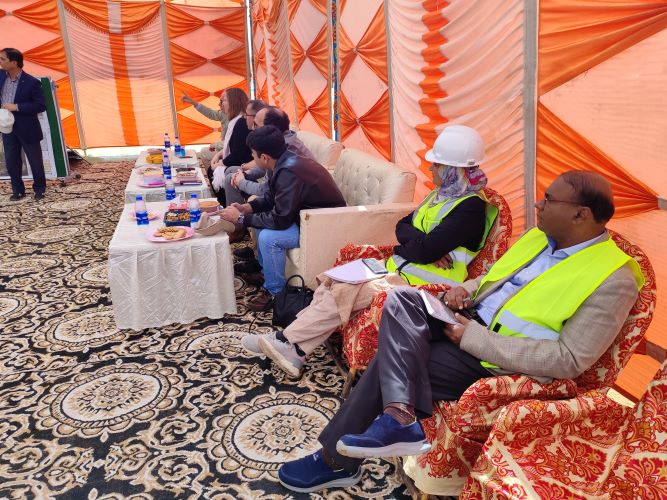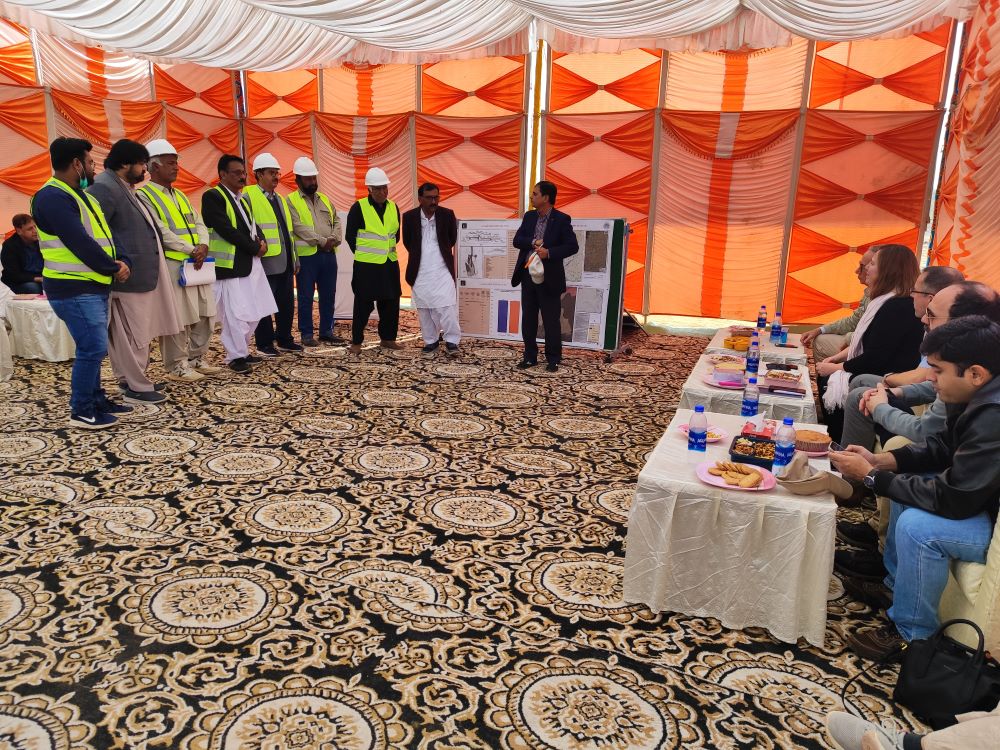
Under a WB-funded project, 11 dams have been built in Mole and Lat Basin area of Malir District
By Rehan Khan Khushik
Karachi, Sindh
World Bank Technical Mission for Sindh Flood Emergency Rehabilitation Project Irrigation Component visited three flood detention dams constructed under Sindh Flood Emergency Rehabilitation Project, funded by World Bank at Lat basin located near Gadap town of Malir District in Kohistan region of Sindh.
The mission comprised of Mr. Ahsan Tehsin, Senior Disaster Risk Management Specialist and Task Team leader, Ms. Amparo Samper Hiraldo, Senior Disaster Risk Management Specialist, Mr. Alessandro Palmieri, consultant, Mr. Jaun Soler Cabado Consultant, Mr. Hendrik Arnold Vernoon Consultant, Mr. Bilal Khalid Disaster Risk Management Specialist and Aijaz Shaikh Consultant.
While briefing the mission, Zahid Shaikh, Senior Water Resource Management Specialist SFERP said that SFERP’s Irrigation component has constructed a total of eleven flood detention small dams.
He said that seven dams are located at Mole Basin and four dams at Lat Basin.
 He said that all streams are non-perennial and water is available mostly during the monsoon season. “These dams will have a dual purpose of recharging the groundwater as well as reduce the flood velocity, and there will be fewer losses to the fertile soil of erosion, habitat destructions, and public amenities like link roads, electricity poles, and local human settlements,” he said.
He said that all streams are non-perennial and water is available mostly during the monsoon season. “These dams will have a dual purpose of recharging the groundwater as well as reduce the flood velocity, and there will be fewer losses to the fertile soil of erosion, habitat destructions, and public amenities like link roads, electricity poles, and local human settlements,” he said.
“Due to the project, intervention water will be available for a longer period, which will augment to uplift socio-economic activities,” he added.
The SFERP was also represented by Aqil Memon, Additional Director. Naeem Arif from Project, Mohammad Nawaz Soomro from project implementation Consultant, Nasir Panhwar, Social Safeguard Consultant and Marvi Baloch, gender specialist accompanied the mission during the visit.
Related news: 11 Flood Detention Small Dams being built in Kohistan and Malir
Naeem Arif, the project consultant briefed the WB technical mission about the Lat-1 Dam that the design discharge of lat-1 flood detention dam is 16570 cusecs, storage capacity area 56 acres, embankment length 4830 ft., reservoir storage capacity 364 acres, width spillway 525 ft., floor level 524 ft., highest flood level 546 ft., embankment top level 550 ft., spillway height 18 ft., embankment height above the river bed is 26 ft.
During the visit at lat-2 Dam site, Mohammad Nawaz Soomro briefed WB team that the commencement date of the lat-2 dam is 20 march 2023 and completion date is 18 March 2024.
He said that the catchment area of the dam is 5 square miles while the spillway type is ogee stepped spillway.
He said that the design discharge of the dam is 9120 cusecs, width of spillway 299 ft., floor level 506 ft., spillway crest level 522 ft., height of flood level 526 ft., and embankment top level is 530 ft.
During visit at Lat-3 dam, Aqeel Memon, Additional Director SFERP said that commencement date of this flood detention dam is 30th March 2023 and planned completion date is 28th March 2024.
The catchment area of the dam is 29 square miles, spillway is Ogee stepped spillway, design discharge is 21.172 cusecs.
Also read: WB Mission highlights future climate change threats to Sindh
He said that width of spillway is 480 ft., floor level 416 ft., height of flood level 431 ft., embankment top level 436 ft., spillway height 10 ft., head above crest 5 ft., free board 4 ft., embankment height above river bed 19 ft., embankment type earth, embankment length 4,434 ft., storage area 29 acres and reservoir storage 101 acres.
Nasir Ali Panhwar, Social Safeguard Specialist said the local population in project areas are using subsurface and groundwater for consumption. The groundwater depth varies from 150 to 300 ft. in different parts of the Kohistan region. The distance traveled by women to fetch water varies from area to area – for instance, in Kohistan, they travel about two to three kilometers distance per trip. “The dams will help in recharging the groundwater and provide water in the areas where it is crucial for drinking, domestic use, and livestock,” he added.
_______________
[…] Also read: WB Mission visits Flood Detention Dams in Kohistan Region of Sindh […]